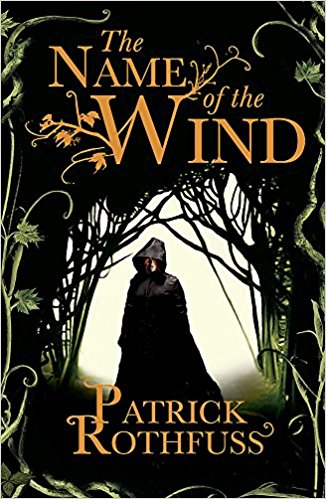What’s all the (Roth)Fuss About?

I’ve started writing this twice and it’s morphed into other blog entries about alternative topics, both related obliquely but not directly to my enjoyment of this book, both became too long, and both had more to do with other topics and less to do with The Name of the Wind. So before I get distracted again and this turns into another elongated preamble…
Some books are plain dull, reading them is akin to watching Parliament Live on a quiet day. Some books are interesting but reading them is like attempting a tongue twister, they just don’t flow easily off the page. Other books are captivating and the words seem to pour straight out of the book, directly into your imagination. Patrick Rothfuss‘ The Name of the Wind falls firmly in the latter category, time flew by while reading this book. Those of you who are bedtime readers may recognise the symptoms, retire to bed at the usual time, say 11pm, check the clock and realise that somehow, in the blink of eye, its 2:16am, decide to ‘just’ finish the chapter before finally wrestling the book out of your unwilling hand and forcing yourself to go to sleep at 3:22am. This sort of inability to stop usually only occurs as I reach the denouement of a book, but so great did my dependency on this book become, that it occurred on three consecutive nights until the book was finished. I declined commencing the next book in the series (The Wise Man’s Fear) immediately on finishing this one due to the need for some quality sleep, but I’ll definitely only be reading one book in between.
The Name of the Wind concerns Kvothe, something of a sword and sorcery polymath, and owner of a fantastical reputation within his own world. The tale unfolds as a series of reminiscences, recounted by Kvothe himself, focusing mainly on his formative years. The format of the story offers a tantalising glimpse of present day Kvothe and by the end of this book while many aspects of his character and the circumstances in which he currently resides remain a mystery, the foundations of his reputation are beginning to coalesce. Young Kvothe is a precocious individual indeed, the kind of multitalented individual that you would have detested to be at school with. Older Kvothe has a thinly veiled darkness about him, which is not present during his self-described youth, it hints at an atrocity either perpetrated or suffered somewhere along the way, which certainly adds to the desire to keep reading and discover source.
I haven’t done it yet, but when I get round to compiling the recommended reads section of this website, The Name of the Wind is certainly going to feature highly. I found the writing to have a lyrical quality, exposition is neatly concealed as the narrator elaborating to the fictional audience. Further, the story itself was compelling, drawing me back to the book whenever I had a few minutes to spare.
I saw this book on shelves and read plenty of positive reviews before I finally got fed up waiting for the price to drop and took the plunge. My only regret? That I didn’t buy it sooner, don’t make the same mistake!